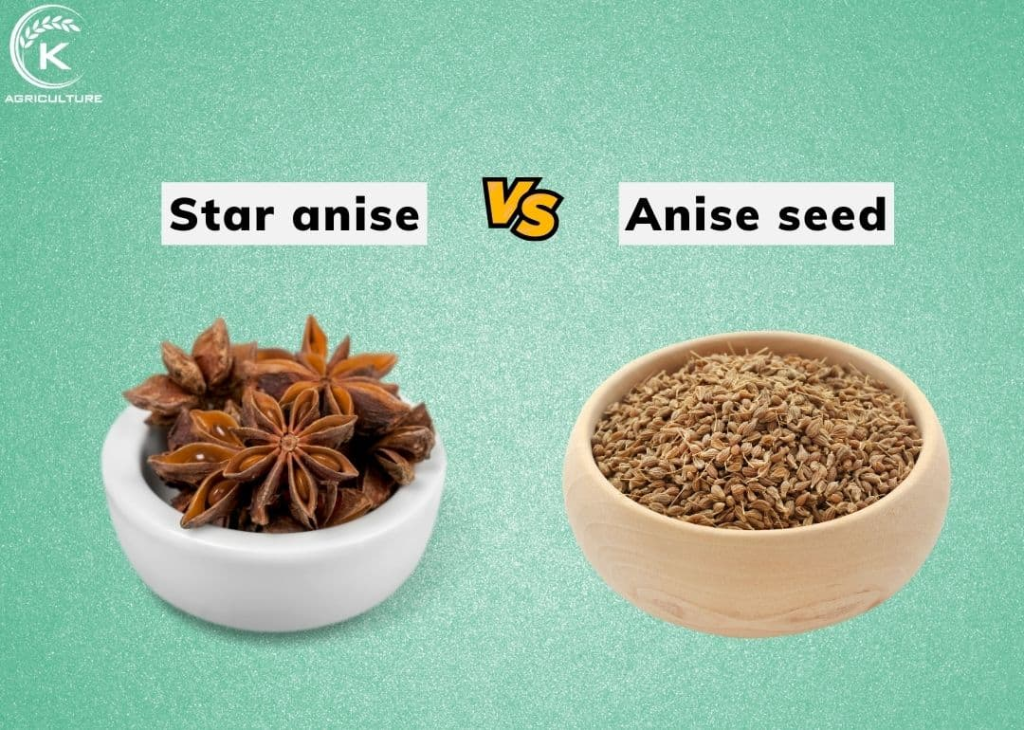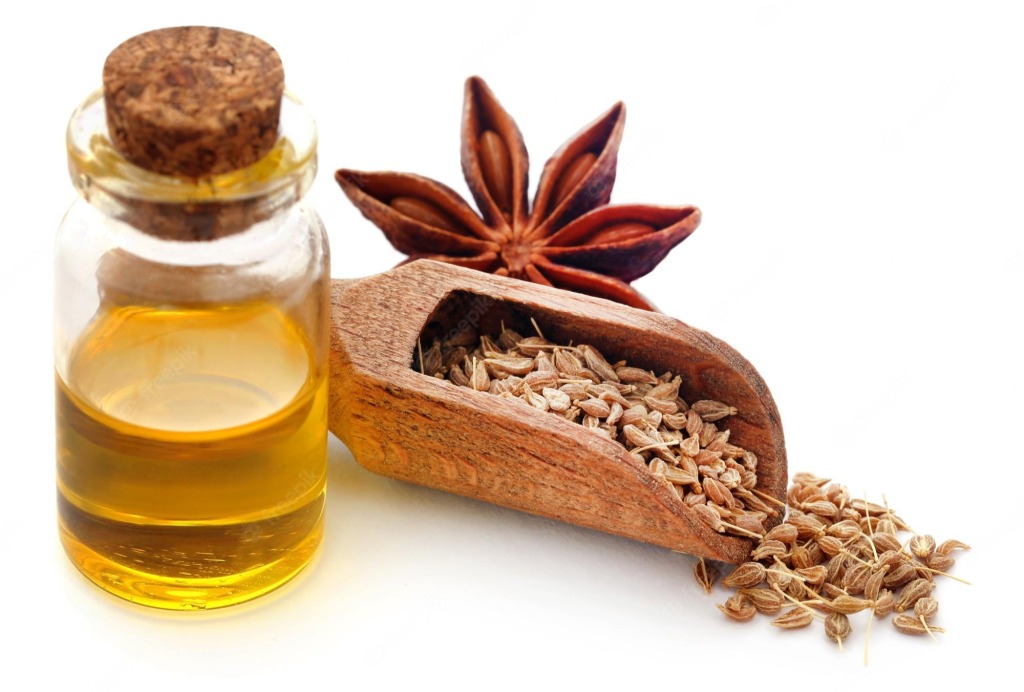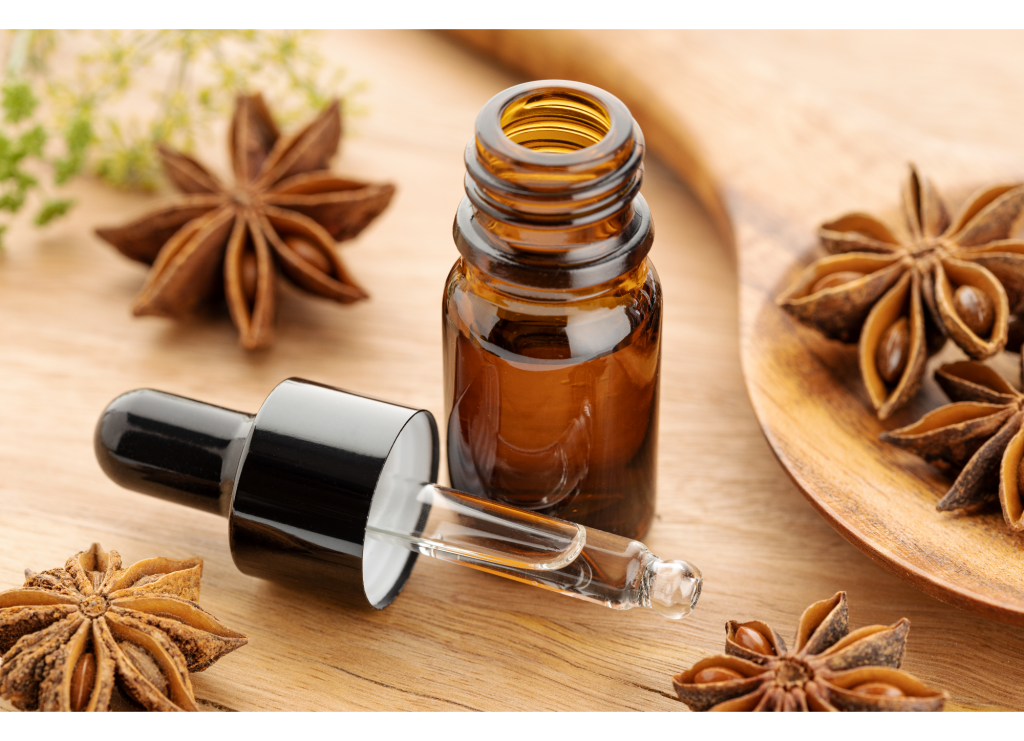Aniseed and star anise essential oils have long been cherished for their unique flavors and therapeutic properties. Whether you’re looking to enhance your culinary creations, improve your health, or simply enjoy their aromatic benefits, these essential oils offer a wealth of possibilities. In this comprehensive guide, we will delve into the origins, uses, and benefits of aniseed and star anise essential oils, helping you unlock their full potential.
Aniseed has had some amazing attention over the centuries. It was used to scent the clothing of kings, flavor dishes spanning from ancient China to Europe in the Middle Ages, and its sale as a spice funded repairs on the London Bridge. It was even believed to prevent bad dreams if put under your pillow at night! Needless to say, anise has had well deserved recognition throughout history and is an essential oil you don’t want to miss.

What are Aniseed and Star Anise Essential Oils?
Aniseed essential oil is derived from the seeds of the Pimpinella anisum plant, native to the Mediterranean region. It has a sweet, licorice-like aroma and flavor that is widely used in cooking, baking, and aromatherapy.
Aniseeds grow on a tender annual that’s in the same family as parsley and fennel. Its leaves are feathery soft with yellow-white flowers not unlike the delicate coriander. The seeds are ribbed, hairy, and reddish-brown with a distinctive licorice smell and flavor. Aniseed originally hails from Greece and Egypt but is now widely cultivated in Spain, France and Russia.

Star anise essential oil comes from the fruit of the Illicium verum tree, which is native to China and Vietnam. It has a similar licorice-like flavor but is more potent and is commonly used in Asian cuisine and traditional medicine.

Star anise comes from an evergreen tree extensively cultivated in Japan, southern China, Vietnam, and India. The essential oil comes from its star like seed pods that have a strong licorice scent and flavor.
Historical and Traditional Use
Aniseed was cultivated by the ancient Egyptians as a culinary spice and medicine for congested lungs and flu symptoms and was though to “refresh the heart”. It was used by the ancient Greeks and Romans as a “pick-me-up” by adding it to a digestive cake that was eaten after meals that also contained fennel and cumin. Egyptians used it in their millet and barley breads for the same purpose. Aniseed was later introduced to Europe by the Romans and carried across the sea to North America by early settlers.
Aniseed was even said to have been used by King Edward IV for scenting bed linens and clothing. The use of aniseed is so old in fact, it can be found in Dioscorides’ De Materia Medica (AD 78), Europe’s first authoritative guide to medicine that was used for the next 1,700 years!
Star Anise was commonly used by ancient Chinese practitioners to aid digestion, bronchitis, colds, flu, muscle aches, rheumatism, and for freshening the breath. It is an excellent remedy for dry coughs when used as a lozenge where the mucus feels stuck and it’s hard to expectorate. It is said that some even smoked star anise to alleviate bronchitis and encourage expectoration. Another common remedy used in Mediterranean countries was adding star anise to wine, called Anisette, and use it for spasmodic asthma and other bronchial ills.
Today, aniseed and star anise are widely used in candy making, baking, spice blends, beverages, and even in tobacco products. Star anise in particular is a must have herb in Chinese and Vietnamese cooking.
Chemical Components
Aniseed and Star Anise contain up to 90-95% anethole and 2-4% methyl chavicol (estragole) which accounts for their amazing antispasmodic properties.
Health Benefits of Aniseed Essential Oil
- Digestive Aid: Aniseed essential oil is known for its ability to alleviate digestive issues such as bloating, gas, and indigestion. It helps stimulate the production of digestive enzymes, promoting healthy digestion.
- Respiratory Health: The oil’s expectorant properties make it effective in treating respiratory conditions like coughs, bronchitis, and asthma by helping to clear mucus and ease breathing.
- Hormonal Balance: Aniseed essential oil contains phytoestrogens, which can help balance hormonal levels, alleviate menstrual discomfort, and reduce symptoms of menopause.
- Antimicrobial Properties: The oil has strong antimicrobial properties, making it useful in fighting bacterial, fungal, and viral infections.
- Calming Effects: Aniseed essential oil has mild sedative properties that can help reduce stress, anxiety, and promote better sleep.
Health Benefits of Star Anise Essential Oil
- Antiviral and Antibacterial: Star anise essential oil contains shikimic acid, a compound used in antiviral medications. It helps boost the immune system and protect against infections.
- Anti-inflammatory: The oil’s anti-inflammatory properties can help reduce inflammation and pain, making it beneficial for conditions like arthritis.
- Digestive Health: Like aniseed oil, star anise essential oil aids in digestion and can relieve symptoms of indigestion and bloating.
- Antioxidant Properties: Rich in antioxidants, star anise essential oil helps combat oxidative stress and protect the body from free radicals.
- Skin Health: The oil’s antimicrobial and anti-inflammatory properties make it useful in treating skin conditions like acne and fungal infections.

How to Use Aniseed and Star Anise Essential Oils
- Aromatherapy: Use a diffuser to disperse the aromatic benefits of these oils throughout your home. Their calming and soothing effects can help reduce stress and anxiety.
- Topical Application: Dilute the essential oils with a carrier oil and apply to the skin to treat infections, reduce inflammation, and improve skin health. Always perform a patch test first to ensure no allergic reactions.
- Culinary Uses: Add a drop or two of aniseed or star anise essential oil to your recipes to enhance the flavor of soups, stews, baked goods, and beverages. Ensure the oils are food-grade before using them in cooking.
- Massage Oil: Combine the essential oils with a carrier oil for a relaxing and therapeutic massage that can help alleviate muscle pain and promote relaxation.
- Inhalation: Add a few drops of the essential oils to a bowl of hot water and inhale the steam to relieve respiratory conditions and clear congestion.
Safety Precautions
- Dilution: Always dilute essential oils with a carrier oil before applying them to the skin to prevent irritation.
- Consult a Professional: If you are pregnant, nursing, or have any medical conditions, consult a healthcare professional before using essential oils.
- Avoid Ingestion: Unless the essential oil is specifically labeled as food-grade, avoid ingesting it.
- Patch Test: Perform a patch test before using the oils topically to ensure there is no allergic reaction.
Aniseed and star anise essential oils are versatile and potent oils that offer numerous health benefits and culinary uses. From promoting digestive and respiratory health to balancing hormones and reducing stress, these oils can significantly enhance your well-being. By understanding their properties and how to use them safely, you can unlock the full potential of aniseed and star anise essential oils in your daily life. Embrace the power of these aromatic elixirs and discover the difference they can make in your health and happiness.


